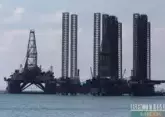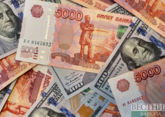Russian Prime Minister Dmitry Medvedev said that the global economic situation has become worse now than it was in 2008, when the financial crisis jolted the world.
"Ten years ago we were much wiser and were ready to withstand the negative consequences of the economic crisis together," Medevedev said, speaking at plenary session of the ASEM summit in Brussels.
When speaking about the worsening of the situation since 2008, the Russian Prime Minister said that the joint global debt had grown several times. He also noted vulnerability of the emerging markets and overall toughening of state monetary policies.
He also pointed at real signs of trade wars in the world. "What is most important that protectionist sentiments have materialized. There are heads of the states at this table, who fully experienced the signs of trade wars. That is the saddest of what is going on now," TASS cited the PM as saying.
"Economic sanctions encroached on the context of international economic cooperation, became a common instrument of political pressure and unfair competition. This is dangerous. Rather than cooperating we are actually weakening our relations," he said.
The PM called the current state of economic relations between Russia and the EU "time of missed opportunities." "The past years have been a time of missed opportunities for economic ties between Russia and the EU," Medevedev said, adding that in recent years Russia has managed to do much more in the eastern direction.
According to him, Russian and European businesses have always been closely linked and stressed that Russia and the EU are long-term partners in such areas as energy, trade, industries, space, and security.
Medvedev noted that Russia has proposed some improvement ideas to the World Trade Organization (WTO) and hopes they will be accepted.
The advisor on macroeconomics to the CEO of the 'Opening-Broker' brokerage house, economist Sergey Hestanov, speaking with Vestnik Kavkaza, noted that the state of the world economy may not be as bad as it seems because of the outbreak of trade wars. "Although the growth of the world economy is accompanied by certain problems, the overall situation is not that bad. Trade wars have not yet caused significant problems due to the inertia in large deliveries of goods. Goods at high prices have not yet reached consumers, therefore, the main indicators have not felt any negative. So we are rather talking about expectations from the future," he said.
“As for debt, a high debt load in developing countries often served as a trigger for a crisis, like in Russia in 1998, but developing countries are not a big part of the economy. In developed countries, the situation with debt is quite normal. The debt load of the U.S. is 105%, Germany - 160%, Japan - 260%, Luxembourg - about 330%. And it doesn’t bother anyone. This is a significant difference between developing countries," Sergey Hestanov noted.
“Another thing is that there is a certain consensus, that another cyclical crisis is on the way, which will affect everyone in one way or another. At the same time, the aggregate world debt may be a reason, but not the true cause of the crisis,” the advisor on macroeconomics to the CEO of the 'Opening-Broker' brokerage house concluded.










